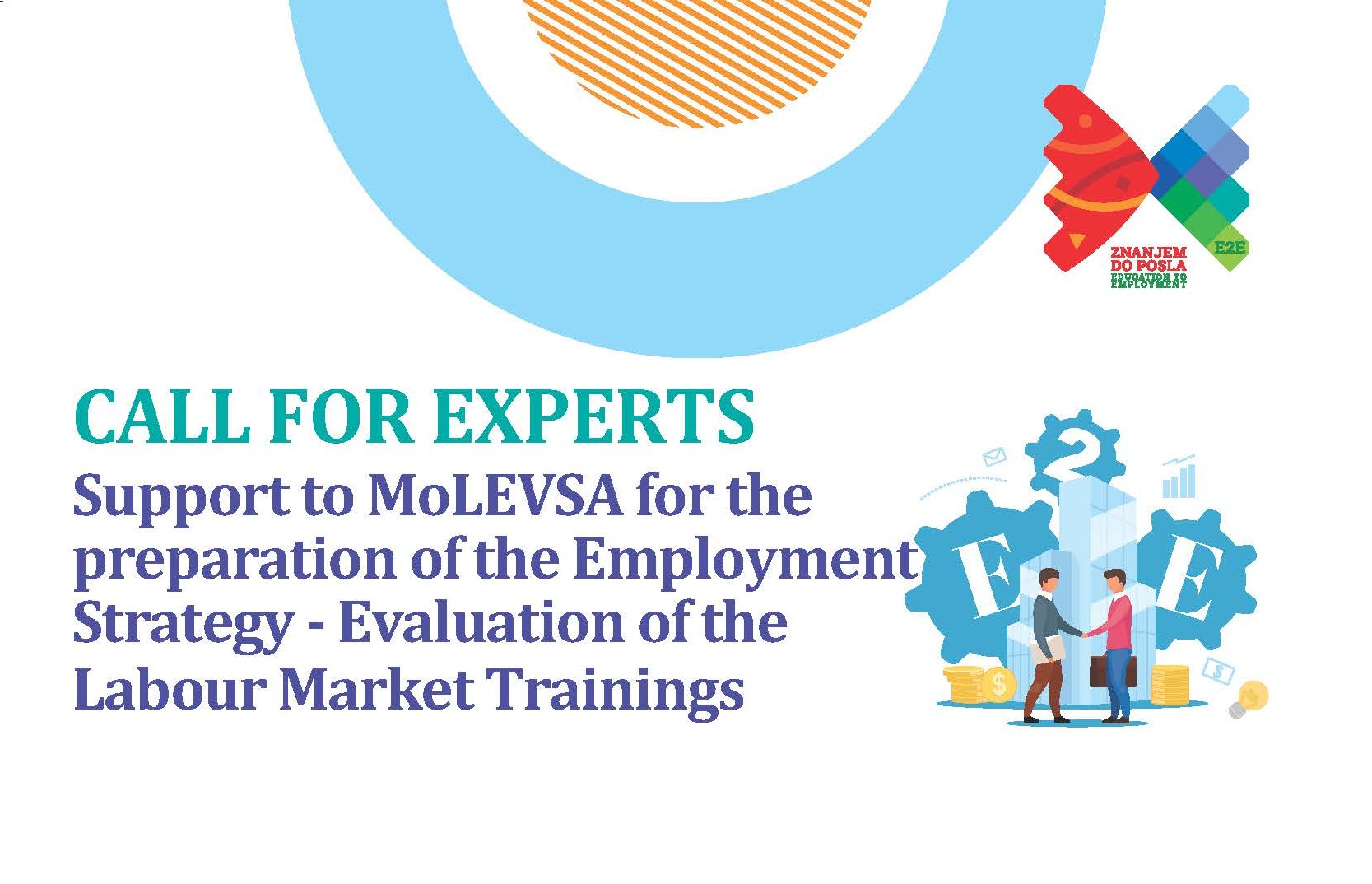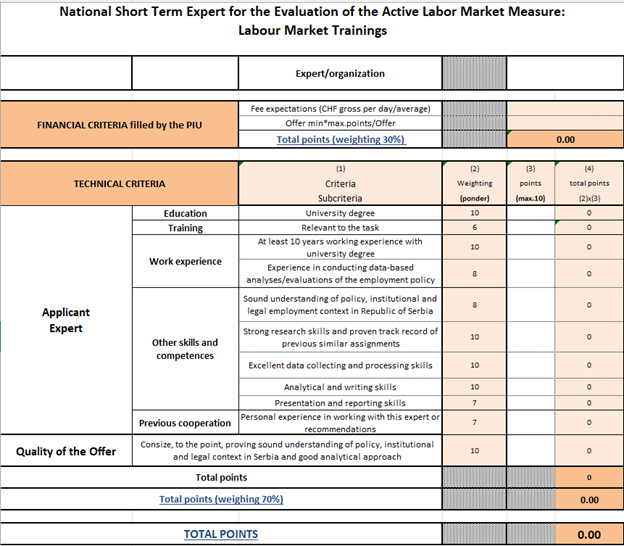Terms of References – Support to the Ministry of Labour, Employment, Veteran and Social Affairs for the preparation of the Employment Strategy of the Republic of Serbia 2027-2032 and Action Plan 2027-2029: Evaluation of the Active Labor Market Measure: Labour Market Trainings

Key Activities:
1.To develop the methodology and working plan for conducting the evaluation of the LMTs;
2. To conduct the evaluation of the LMTs with interpretation of research findings and recommendations for improving the design and implementation of the measure in the next strategic period of the employment policy (2027 – 2032);
3. To present final findings and recommendations at round tables with stakeholders that will be invited by the MoLEVSA.
1. Background and Context
The Swiss Agency for Development Cooperation (SDC) assigned NIRAS Germany to implement the project “From Education to Employment (hereinafter: E2E) – Phase III that commenced in May 2024 and will last until 30th April 2028.
The E2E, through NIRAS, supports evidence-based approaches in the employment policies in Serbia. At the national level, the key line ministry in charge of the implementation of the employment and employability policies in Serbia relevant for implementation of the E2E is the Ministry of Labour, Employment, Veteran and Social Affairs (hereinafter: MoLEVSA). The E2E also closely cooperates with several other relevant institutions and organizations i.e. the National Employment Service, the Agency for Qualifications, the Office for Dual Education and National Qualification Framework, the Chambre of Commerce and Standing Conference of Towns and Municipalities. The E2E supports national policy partners in improving legal and strategic framework for employment, as well as in establishing the system of CGC support and accreditation of informal trainings.
On the local level, the E2E aims at enhancing employability in fifteen districts, through cooperation with local partners, mainly civil society organizations, that establish and accredit career centres entitled Job Info Centre. Through the promotion of CGC services for pupils/students as well as the job seekers, the E2E facilitates their entry into working life.
The overall goal of the E2E is that women and men, including vulnerable groups benefit from new or better employment opportunities through improved employment support services and industry–led training offer. The project has three outcomes:
Outcome 1 (People): More women and men make use of better CGC, improved employment support services and training solutions.
Outcome 2 (Services): Companies make use of employment support and advisory services to improve their training offer and HR practices.
Outcome 3 (Enabling Environment): Sub-national and national policy makers and implementers create a more enabling institutional and policy environment for employment and employability.
As per Outcome 1, the following relevant key outputs are envisaged:
Output 1.2 – Goal: Non-profit CGC service providers offer & scale improved CGC services, gaining further visibility and attracting more public funds e.g. Youth Guarantee, LSGs.
As per Outcome 3, the following key Outputs are envisaged:
Output 3.1 – Goal: LSGs are able to plan and implement updated active labour market measures in a participatory manner (LEAPs) and increase funding for CGC and training provision via local budgets.
Output 3.2 – Goal: Licensed local labour market services providers improve specialised services for integrating vulnerable groups using public funds (PEAs, CSOs).
Output 4.1 – Goal: MoLEVSA adjusts the legal and strategic framework and changes their ALMMs practices to enable the allocation of public funds towards CSOs (Employment Law; Youth Guarantee Initiative, Occupational Standards).
This Terms of Reference is primarily related to the achievement of Outcome 3, Output 4.1 and aim to support the MoLEVSA as an institutional focal point for the E2E in the development of the Employment Strategy of the Republic of Serbia 2027-2032 and corresponding Action Plan for the implementation of the Employment Strategy in the period 2027-2029 as it is envisaged in the Memorandum of Understanding between the MoLEVSA and the Swiss Confederation/Swiss Agency for Development and Cooperation signed on December 6th 2023, stipulating a detailed list of policy activities that will be supported through E2E/NIRAS. The results of the Labor Market Trainings evaluation will be used in the development of the above-mentioned policy documents.
The Labor Market Trainings (hereinafter: LMTs) is an active labor market measure (hereinafter: ALMM) in which unemployed persons are included in order to gain additional theoretical and practical knowledge and skills in line with labour market and employer needs, with the aim of enhancing the employability of unemployed persons, primarily those hard-to-employ with no or low qualifications[1]. LMTs is implemented after the public procurement procedure for the selection of contractors has been carried out, in accordance with the regulations governing public procurement.
According to the MoLEVSA`s annual narrative reports on the implementation of the AP 2021-2023, 2,490 unemployed persons or 71% of the planned number of participants (3,500) were included in LMTs. The largest number of participants was included in 2023 – 1,616 (2021 – 63; 2022 – 811). The gross effect of the LMTs measured as employment or work engagement of the person included in the measure on the 180th day after exiting the measure or contractual obligation was 16.9% in 2021 (for participants included in the measure in 2020), 15.63% in 2022 (for participants who have completed the training in the period from July 2021 – June 2022) and 35.29% in 2023 (for participants who have completed the training in the period from July 2022 – June 2023), which are in all three cases significantly bellow the average gross effects of the financial ALMMs in total (47,5% in 2021, 49.66% in 2022 and 47.3% in 2023). The measure is implemented by the National Employment Service (NES).
2. Objective of the Assignment
The objective of the assignment is to conduct the evaluation of the labour market trainings implemented in 2021, 2022 and 2023, to provide recommendations for improving the design and implementation of the measure based on the evaluation results, and to present final findings and recommendations at round tables with stakeholders that will be invited by the MoLEVSA.
The tasks of the Expert shall be:
1.To develop the methodology and working plan for conducting the evaluation of the LMTs (in close consultation with MoLEVSA and E2E PIU);
2. To conduct the evaluation of the LMTs with interpretation of research findings and 3. recommendations for improving the design and implementation of the measure in the next strategic period of the employment policy (2027 – 2032);
3. To present final findings and recommendations at round tables with stakeholders that will be invited by the MoLEVSA.
Within the Task 2, it is expected to:
- analyse the LMTs implemented in 2021, 2022 and 2023 according to the NES training catalogues (for other unemployed persons; for persons without a high school diploma and persons completing primary education according to the functional adult primary education model; for persons with disabilities)[2] and to the specific training within each of catalogue;
- analyse the complete process of implementing the LMTs;
- analyse the structure of the unemployed persons included in the LMTs, according to the gender, educational level, age, job search period, the belonging to the hard-to-employ categories, etc. for each NES training catalogues and each specific training;
- analyze the structure of those who left the LMTs (dropouts), according to the gender, educational level, age, job search period, the belonging to the hard-to-employ categories, etc. for each NES training catalogues and each specific training;
- analyse the gross effects on the employment only for those participants of the measure in 2021, 2022 and 2023 who successfully completed LMTs, based on administrative data (CROSO[3]/NES) – according to the NES training catalogues, to each specific training, etc;
- compare the gross effects on the employment with funds invested in implementation of the LMTs – in total – per year, according to the NES training catalogues, to specific training, to employed participant, etc;
- assess the satisfaction with participation in the measure and the impact that the measure had on improving position of the participants on the labor market; the survey should be implemented on the selected sample of participants/focus groups, with the questionnaire developed by the expert;
- assess the satisfaction of the contractors who provide the measure, to get their opinions on implementation procedures, suggestions for improvement of the measure, etc; the survey should be implemented with the questionnaire developed by the expert;
- provide interpretation of research findings in such a way to make them useable for the designers and implementers of the measure (MoLEVSA, NES);
- to provide recommendations for improvement of the measure – design and implementation.
The mandate shall be performed in close cooperation and consultation with MoLEVSA and E2E PIU.
3. The Expert’s profile
The proposed key expert shall have the following skills, experience and qualifications:
- University degree
- At least 10 years working experience with university degree
- Sound understanding of policy, institutional and legal employment context in Republic of Serbia
- Experience in conducting data-based analyses/evaluations of the employment policy
- Strong research skills and proven track record of previous similar assignments
- Excellent data collecting and processing skills
- Other skills required on high level:
- Analytical and writing skills
- Presentation and reporting skills
4. Deliverables
The deliverables of the assignment shall comprise:
For the Task 1:
- Develop a draft methodology and work plan for the LMT`s evaluation – by July 22nd, 2025;
- Conduct the consultation process with MoLEVSA and E2E, collect and integrate different feedbacks and submit the final methodology and work plan for the LMT`s evaluation – by July 31st, 2025.
For the Task 2:
- Create the 1st draft LMT`s evaluation – by November 18th, 2025;
- Conduct the consultation process with MoLEVSA and E2E, collect and integrate feedback regarding the proposed 1st draft and submit the 2nd draft LMT`s evaluation – by January 30th, 2026;
- Conduct the consultation process with MoLEVSA, NES, E2E and other stakeholders, collect and integrate feedback regarding the proposed 2nd draft and submit the final LMT`s evaluation – by March 31st, 2026.
For the Task 3:
- Submit copies of proving documentation (presentations, minutes, attendance lists, etc) – by May 29th, 2026.
All the deliverables, for all three tasks, should be created in close communication with the main beneficiairy (MoLEVSA) and E2E and submitted in Serbian language.
5. Timeline, Venue, and Reporting
For the realization of tasks defined in Article 2, the assigned number of days is up to 20 working days, which is expected to be realized in the period July 8th , 2025 – May 29th, 2026.
All tasks will be carried out in Belgrade with the possibility of meetings to be held outside of Belgrade, whereby the expenses of the experts (travel costs, hotel) will be paid by the E2E.
The expert is reporting to the Policy and LLM Governance Advisor – Nevena Letić.
6. Estimated budget and contracting
The service contract which is to be signed by two parties shall cover the period between July 8th, 2025 and May 29th, 2026.
Remuneration shall include gross fee per day based on a service contract which is to be agreed and signed by the two parties.
Financial offer should be calculated on gross amount/fee. If Consultant apply as a “physical person”, and according to the Serbian Taxation and Labour Law, the Company (NIRAS) will calculate and pay taxes as a deduction from the gross amount and pay net amount to the Consultant.
E2E will further bear all costs regarding transportation and accommodation in the field.
7. Dynamics of Payment
- First instalment – against timesheets and deliverables after completing Task 1;
- Second instalment – against timesheets and deliverables after completing Task 2 and Task 3.
8. Application Procedure
Deadline for Application: June 23rd, 2025
Individual consultants and organizations can apply for this assignment.
Applicant are requested to submit the following:
- Technical offer – suggested methodology and timeline for implementing the three tasks;
- Information on the experience of the expert or organization in the implementation of similar activities (at least 2 reference projects);
- CV of the expert;
- Financial offer based on man-days per task in gross CHF covering the anticipation and division of working days per each tasks.
Submission of Applications should be done to the email address: E2E@Niras.com and Nevena Letić nele@niras.com no later than June 23rd, 2025.
Only shortlisted candidates will be contacted by July 2nd, 2025.
Evaluation grid

[1] Action Plan 2021-2023 for the implementation of the Employment Strategy of the RS 2021-2026
[2] NES annual work reports: https://www.nsz.gov.rs/sadrzaj/izvestaj-i-program-rada-nsz/4109
